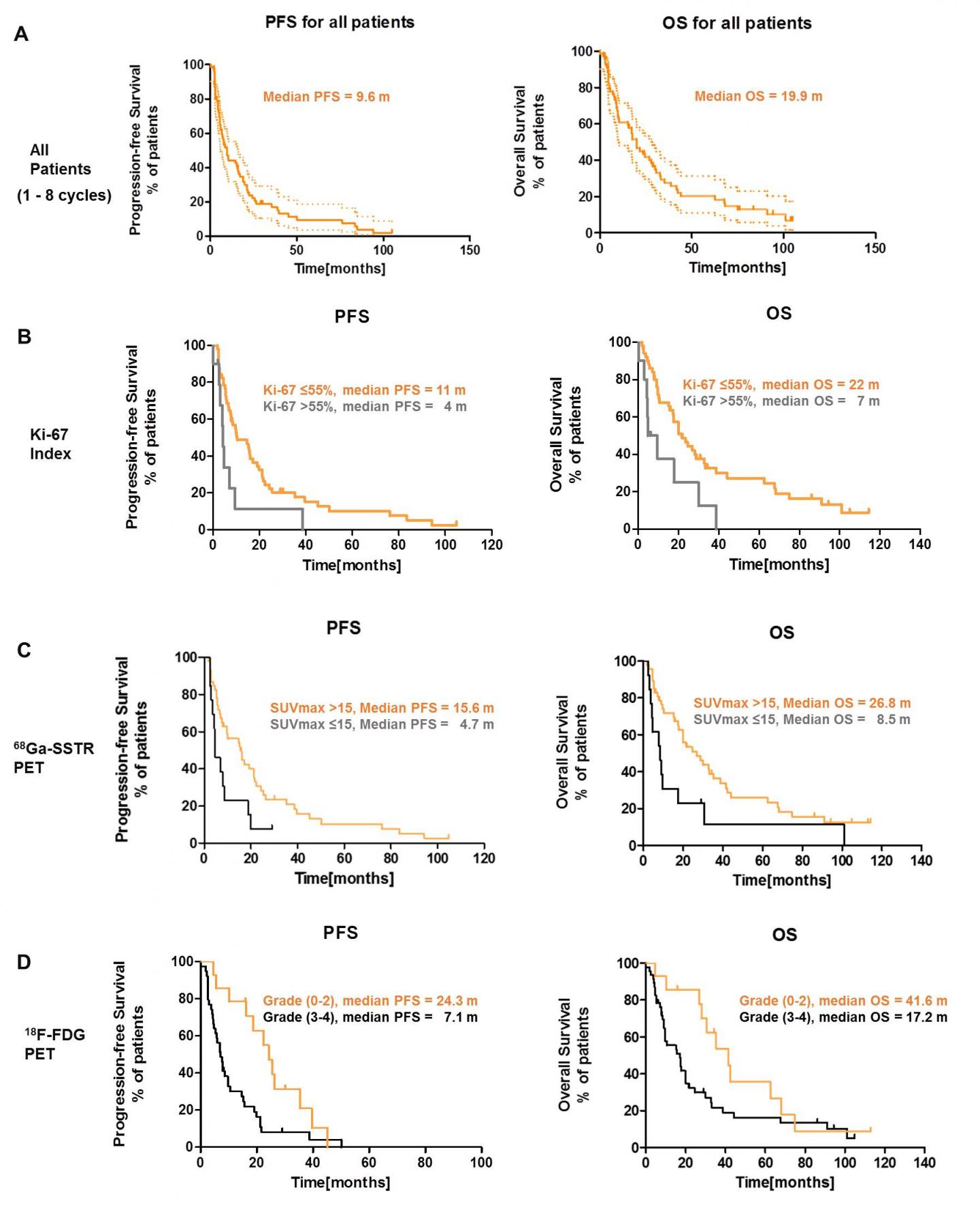New study provides basis for expansion of clinical indications for patients with progressive neuroendocrine tumors

Credit: J Zhang et al., THERANOSTICS Center for Molecular Radiotherapy and Precision Oncology, Zentralklinik Bad Berka, Germany.
Peptide receptor radionuclide therapy (PRRT) has been shown to be safe and effective for patients with grade 3 (G3) neuroendocrine neoplasms (NENs), according to research presented at the Society of Nuclear Medicine and Molecular Imaging’s (SNMMI) 66th Annual Meeting.
“While numerous studies have demonstrated the effectiveness of PRRT in well-differentiated grade 1 and 2 neuroendocrine neoplasms, limited data has been reported on PRRT in G3 NENs,” noted Richard P. Baum, MD, PhD, chairman and clinical director at THERANOSTICS Center for Molecular Radiotherapy and Precision Oncology in Bad Berka, Germany. “Our study–which followed the largest cohort of G3 NEN patients for the longest period of time–aimed to assess the safety and efficacy of PRRT in terms of survival analysis. In addition, we evaluated the utility of positron emission tomography (PET)/computed tomography (CT) in predicting long-term prognosis.”
In the study, 69 patients with various types of metastatic, progressive G3 NENs received PRRT with 177Lu- and/or 90Y-labeled DOTATATE or DOTATOC. For some patients this therapy was a first-line treatment, but for the majority, PRRT was a second- or third-line treatment. Patients were followed for a median of 94.3 months, and progression-free survival and overall survival rates were calculated.
The median progression-free survival rate for patients with G3 NENs was 9.6 months, and the overall survival rate was 19.9 months. When taking into account the Ki-67 index, which measures a key protein associated with cell proliferation, researchers found a significant difference between survival rates. Patients with a Ki-67 index less than or equal to 55 percent responded more favorably to the PRRT than others, with a median progression-free survival rate of 11 months and an overall survival rate of 22 months.
“Compared to studies evaluating the efficacy of chemotherapy for NEN patients with a Ki-67 index less than or equal to 55 percent, PRRT has a longer overall survival rate–22 months versus 14 months,” the researchers pointed out. “These results suggest that PRRT, rather than chemotherapy, may be a superior first-line therapeutic option in selected patients with a high level of SSTR expression and a Ki-67 index of less than or equal to 55%.”
In addition to tracking survival rates, researchers also performed response assessments with 68Ga-SSTR PET/CT and 18F-FDG PET/CT. Patients with a good response and favorable outcome after PRRT were observed to have a relatively higher SUVmax with 68Ga-SSTR PET/CT imaging. Patients with no or minor 18F-FDG uptake responded well to PRRT, and the survival rates were significantly longer than for those with avid 18F-FDG uptake. In terms of stratifying patients, the mismatch pattern of low 18F-FDG uptake and high 68Ga-SSTR uptake was associated with a better long-term prognosis.
Jingjing Zhang and Richard P. Baum of Zentralklinik Bad Berka noted, “Overall, our findings demonstrated that PRRT was tolerated well, without any significant adverse effects, and was effective in patients with G3 NENs, even those for whom chemotherapy had failed. These findings provide the basis for the expansion of clinical indications of PRRT in the future.”
###
Abstract 560. “Peptide Receptor Radionuclide Therapy (PRRT) in Patients with Progressive Grade 3 Neuroendocrine Neoplasms (NEN),” Jingjing Zhang, MD, PhD, THERANOSTICS Center for Molecular Radiotherapy & Precision Oncology, Zentralklinik Bad Berka, Bad Berka, Germany; Harshad R. Kulkarni, MD, Zentralklinik Bad Berka, Bad Berka, Thuringia, Germany; Aviral Singh, MD, MSc, Zentralklinik Bad Berka GmbH, Bad Berka, Germany; Karin Niepsch, Zentralklinik Bad Berka, Bad Berka, Germany; Dirk Mueller, PhD, Radiopharmacy, Zentralklinik Bad Berka, GmbH, Bad Berka, Germany; and Richard P. Baum, MD, PhD, Zentralklinik Bad Berka, Bad Berka, Germany. SNMMI’s 66TH Annual Meeting, June 22-25, 2019, Anaheim, CA.
To schedule an interview with the researchers, please contact David Harrison at (410) 804-1728 or [email protected]. All 2019 SNMMI Annual Meeting abstracts can be found online at http://jnm.
About the Society of Nuclear Medicine and Molecular Imaging
The Society of Nuclear Medicine and Molecular Imaging (SNMMI) is an international scientific and medical organization dedicated to advancing nuclear medicine and molecular imaging, vital elements of precision medicine that allow diagnosis and treatment to be tailored to individual patients in order to achieve the best possible outcomes.
SNMMI’s more than 16,000 members set the standard for molecular imaging and nuclear medicine practice by creating guidelines, sharing information through journals and meetings and leading advocacy on key issues that affect molecular imaging and therapy research and practice. For more information, visit http://www.
Media Contact
David Harrison
[email protected]




